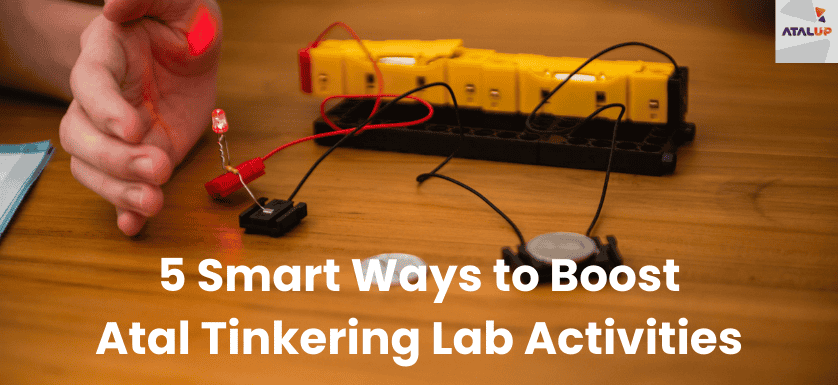
10,000 schools across India have set up ATL labs but many struggle to run them actively throughout the year. Schools face different challenges like unavailability of teachers, disorganized materials, improper storage of equipment, lack of documentation, limited resources, coordination issues, etc.
The government of India is all set to fund 50,000 schools in the next 5 years for ATLs. Let’s explore 5 ways to achieve a smooth Atal Tinkering Lab activity workflow model for future years.
5 Smart Ways to Boost Every Atal Tinkering Lab Activity
1. Automate Scheduling with AI-Driven Calendars
Running more activities starts with better planning. However manual scheduling often leads to clashes, missed sessions, or repetitive tasks. Though Atal Innovation Mission has already given a yearly calendar, it is important to have a customized calendar for daily activities.
ATALUP solves this with an AI-powered scheduling system that automates your ATL calendar. It suggests activity slots based on school timings, public holidays, and the availability of ATL teachers. With this automation, your students won’t miss any sessions and teachers can focus on creativity instead of coordination.
2. Organize Inventory for Easy Access & Usage
Untracked or scattered ATL kits lead to low activity frequency. If teachers or students can’t find tools easily, they’re less likely to initiate experiments. In 30 to 40 minutes of the session, if your students are spending more time finding and arranging ATL equipment, then they won’t get much time to understand the Atal Tinkering Lab activity and conduct it successfully.
ATALUP’s smart inventory system labels each kit with QR codes, tracks consumables, and logs photo-based usage reports. This makes tools and materials always accessible, leading to more spontaneous and planned activities.
3. Empower Teachers through Training & SOPs
Teachers are the backbone of every ATL. But without proper training and guidance, they hesitate to try new activities. ATL is totally different from regular science experiments. ATL is based on STEM education. It focuses on application-based learning. Hence, teachers must know how to execute every Atal Tinkering Lab activity and simply teach them.
ATALUP provides structured onboarding, step-by-step SOPs, and expert-led teacher sessions, making it easy for teachers to understand equipment, plan projects, and confidently run sessions. Trained teachers = more frequent, higher-quality ATL activities.
4. Integrate ATL with Your School Curriculum
ATL shouldn’t feel like an “extra” task, it should blend into daily learning. That’s when frequency increases. The government of India is aiming to enroll futuristic learning methods in India. If our schools treat ATL as an extracurricular activity, we might lose extraordinary talents. If you check out the PISA exam’s format, it mainly focuses on students’ capability of implementing knowledge to resolve real-life problems. That’s how most of the major countries are teaching their students.
With ATALUP’s curriculum alignment support, teachers get help mapping science and math topics with ATL projects. Imagine learning electric circuits in class and building a working model the same week in ATL, it’s engaging, practical, and boosts activity count naturally.
5. Monitor Progress and Showcase Every Session
If ATL sessions go undocumented, they’re often forgotten. That affects motivation and funding support. These documentations not only help future students and coordinators conduct every Atal Tinkering Lab activity but also build transparency between schools and NITI Aayog. Submitting a detailed activity report is essential for ATL compliance.
ATALUP enables real-time activity tracking, stores logs with images and outcomes, and auto-generates reports for ATL performance. Schools can use this to showcase their work to parents and management, and even apply for additional funding or CSR support. More visibility leads to more commitment—and more sessions.
Success Story: How ATALUP Transformed a Pune School’s ATL
In Pune, a reputed school faced challenges in maximizing its Atal Tinkering Lab’s (ATL) potential. Over six years, only 100 activities were conducted due to disorganized materials, lack of documentation, and coordination issues.
ATALUP intervened with a structured approach:
- Organized Materials: Sorted and labeled all kits, creating photo-based inventories for easy reference.
- Defined Activities: Outlined specific activities for each kit, enabling efficient execution.
- Systematic Processes: Implemented guidelines for material handling, scheduling, and lab operations.
The impact was remarkable. Within just 27 days, the school conducted 3,158 activities, averaging over 50 per session. The lab now runs multiple sessions daily, fully utilizing its resources and engaging students effectively.
Conclusion
If your ATL Lab is under-utilized or struggling with activity planning, ATALUP is your solution. From scheduling and inventory to training and reporting, it handles the heavy lifting so schools can focus on innovation. More structure, less stress, and a steady rise in every Atal Tinkering Lab activity. If you are looking for unique and engaging ideas for every Atal Tinkering Lab activity, check out our blog here.